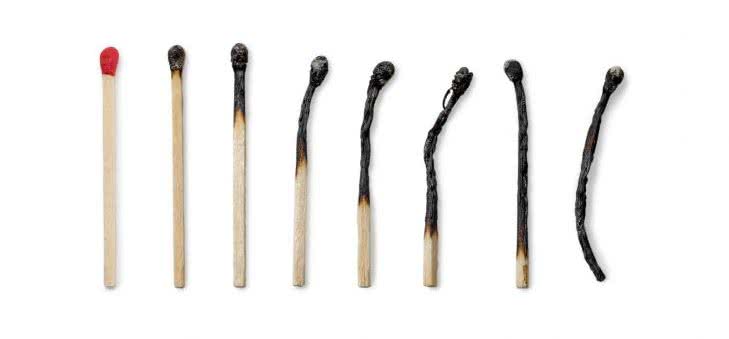There’s no doubt about it: planning events is incredibly stressful. So stressful, in fact, that “event coordinator” was named the fifth most stressful job of 2016.
The deadlines are tight, the pressure is high, and the hours are long. Sometimes you barely have time to take a break — or eat. And while you love what you do, adrenaline and caffeine can only keep you going for so long. To sustain yourself in the long run, you have to find ways to maintain your mental and physical health.
Here are five steps you can take to avoid burnout as an event manager:
1. Start your day with 10 minutes of calm
You’re about to head into a day full of negotiations with vendors and venues.
Author of Burnout to Brilliance, Jayne Morris, suggests meditating in the morning while you’re still in bed. “Focus your attention on your breath and take a series of 10 full, deep breaths,” she says. “Purposefully set a positive intention for the day ahead.
“Next, take a shower or listen to some music, drink a cup of tea, play with your children; whatever you do, do it with your mind present in the moment with the intention of setting the scene for the rest of your day.”
Taking 10 short minutes in the morning to clear your mind can help you become more happy and productive all day long.
2. Eat breakfast before checking emails
It’s happened more than once — you rush out the door without eating breakfast. After a day of meetings with sponsors and caterers, you realize you haven’t eaten anything all day.
Your body needs fuel to get through a busy day, but many of us end up skipping breakfast. Once we’ve engaged with the workday by checking our phones, the sense of urgency to get to work increases — and food is no longer a priority.
According to Fawne Hanson, author of the Adrenal Fatigue Solution, this is a big mistake for people who are at risk of burnout.
“The importance of breakfast cannot be overstated,” she says. “When we sit down at our breakfast tables we have been fasting for approximately 12 hours. Our bodies need fuel; the right kind of fuel that is going to last us through the morning.
“At breakfast, you should be eating a high-quality source of protein combined with a small amount of high-quality carbohydrates. A vegetable omelet or two poached eggs with blueberries would be two good examples.”
Hanson adds that eating at regular intervals during the day is vital because cortisol (the stress hormone) is intimately linked to blood sugar stability. Keep a packet of nuts or dried fruit in your pocket to keep yourself going between meals.
3. Swap coffee for herbal tea
Your ticket stales have stalled and you need to rethink your event promotion. First thing you do is reach for coffee.
You may drink coffee to boost your productivity, but your all-day lattes could actually be pushing you towards a burnout.
Holistic nutrition coach Nancy Desjardins explains: “Coffee stimulates the adrenal glands, which means that every time you drink coffee, you’re activating the body’s fight-or-flight response. What happens over time is that your adrenal glands start to burn out from overuse, which can lead to adrenal fatigue.”
Desjardins suggests substituting coffee with nettle or green tea, both of which offer a natural boost with their minerals, nutrients, and antioxidants. You’ll get the energy you need — without the added stress.
4. Exercise…in moderation
Exercise is great for maintaining a healthy body and mind, but moderation is key. People in high-stress careers often think they have to put in as much work at the gym as they do at the office, and this becomes another stressor.
Dr. James L. Wilson, author of Adrenal Fatigue: The 21st Century Stress Syndrome, says exercise should not be highly competitive or grueling if you’re feeling close to burnout.
“Yoga with breathing exercises, tai chi, kickboxing, swimming, fast walking, and dancing are all good ways to get your body moving. Pick something that is enjoyable to you.”
Meanwhile, those who don’t feel like exercising at all should persist with gentle activity.
“There will be days that you do not feel like doing anything physical,” he says, “but do not let [that feeling] undermine your commitment to your health.”
Exercise may be the last thing you want to do when you’re tired, but sticking with your routine will result in an overall energy and mood boost.
5. Get quality sleep
Sleep deprivation is sometimes unavoidable for event professionals, but making the most of the sleep you do get can go a long way.
After collapsing from fatigue one day, Arianna Huffington “went from four to five hours to seven to eight hours” of sleep. Huffington also adheres to a strict “device-free” period prior to bed, and in the morning immediately after waking.
“At the end of the day, pick a time when you turn off all of your devices and gently escort them out of your bedroom,” she advises. Remove the temptation to check your phone the second you wake up; don’t allow your daytime challenges and problems to intrude on your time to recharge at night.
Too much stress is not only bad for your health — it could be a career killer. Take steps to avoid burnout now, and enjoy your career for many years to come.
To learn more habits of successful event organizers, check out “The Top 10 Qualities of Successful Event Managers.”
To learn more about the latest event trends and equip your event strategy with more knowledge, sign up for Eventbrite’s free event management courses and certifications.
Looking to grow your career in events? Follow us on LinkedIn for the latest trends and industry news.





